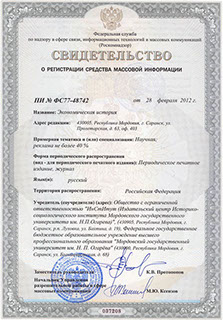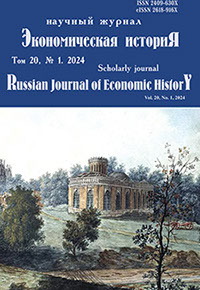Экономическая историЯ
Russian Journal of Economic History
ISSN 2409-630X (Print)
ISSN 2618-916X (Online)
Expert board:
- Scientific Council of RAS on economic history;
- Research and Educational Center «The economic history of Central Russia and the Middle Volga region» of Ogarev Mordovia State University;
- Center of Economic History of Lomonosov Moscow State University
Navigation
Certificate of registration

ISSN 2409-630X (Print), ISSN 2618-916X (Online)
DOI: 10.15507/2409-630X.064.020.202401.067-080
Tatyana I. Shcherbakova
National Research Ogarev Mordovia State University (Saransk, Russia),
e-mail: tatyana_shcherbakova@bk.ru
Mordovian Autonomy in the Labyrinths of Modernization
Abstract
Introduction. National autonomies arose during the period of nation-building as a form of overcoming the backwardness of non-Russian peoples. The article examines the features of the formation of the Mordovian autonomy, as well as the nature and results of the transformation of the region during its existence.
Materials and Methods. The tasks of the article are realized through the analysis of documents from the Central State Archive of the Republic of Mordovia.
Results. The Mordovian autonomy was formed in a decade later than the rest, in the context of a paradigm shift in the national policy of the USSR from national self-determination to centralization. The Union Center was interested in measures to support the Mordovian national culture, languages, printing, book publishing and the involvement of the Mordovian population in socialist transformations. Significant progress in the development of the region’s industry was achieved through centralized investments and was accompanied by an increase in the urban population of the republic and an increase in the importance of the Russian language.
Discussion and Conclusion. The Mordovian autonomy was formed at a time when the national periphery turned from subjects into objects of the center’s policy. Providing support for the national school, languages and culture, the center blocked the nativization of the bureaucracy and the translation of office work into Mordovian languages, trying to prevent ethnonationalism. In the second half of the 20th century, high rates of industrial development of Mordovia and universal bilingualism of the Mordovian population were ensured. Against the background of these achievements, the 1978 Constitution confirmed the status of the republic as an object of the center’s transformative activities, without forming mechanisms to realize the interests of the local population. Having played the role of the most important instrument of modernization, the Mordovian autonomy ensured the development of the republic’s productive forces, the formation of bilingualism of the Mordovian population, and the involvement of the Mordovians in the union-wide socio-political context. Since the population of the republic was considered by the authorities not as a subject, but as an object of transformation, the results of the policy were not only intensive modernization processes, but also serious social and infrastructural imbalances, causing a crisis of Soviet national policy.
Keywords: Mordovian autonomy, Soviet modernization, socialist transformations, Soviet national policy, nation-building.
For citation: Shcherbakova T. I. Mordovian Autonomy in the Labyrinths of Modernization. Ekonomicheskaya istoriya = Russian Journal of Economic History. 2024; 20(1): 67–80. (In Russ.). DOI: 10.15507/2409-630X.064.020.202401.067-080.
© Ogarev Mordovia State University. History and Sociology Institute, 2017
68, Of. 411, Bolshevistskaya St., 430005, The editorial office of the scholarly journal «Russian Journal of Economic History»
Tel.: (8342) 24-25-90; 27-07-11, Fax: (8342) 24-25-90, E-mail: jurnal-econom-hist@isi.mrsu.ru
Designed by A. Napalkov, Email: napalkov@isi.mrsu.ru

